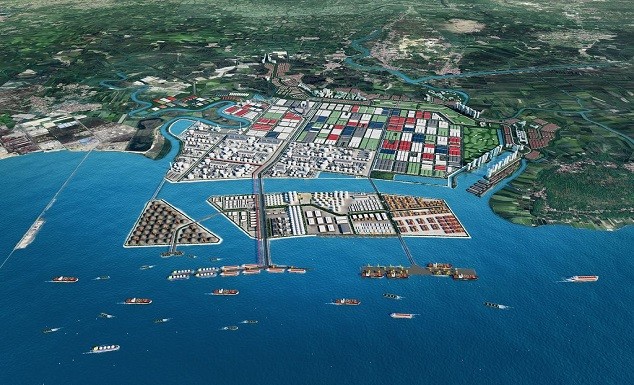 Emerging and developing nations need to accelerate trade digitalisation. Pre-empting the second story in the Digital Series, to be published on Monday, Pascal Ollivier, founder and president, Maritime Street outlines five reasons port community systems matter more than ever.
Emerging and developing nations need to accelerate trade digitalisation. Pre-empting the second story in the Digital Series, to be published on Monday, Pascal Ollivier, founder and president, Maritime Street outlines five reasons port community systems matter more than ever.
In recent times, attention and money have naturally gravitated to the growing wave of disruptive start-ups and scale-ups, online marketplaces, mobile apps, AI/ML, analytics, blockchain, IoT and other emerging digital technologies aimed at transforming logistics, transport and supply chain operations.
Now, as our world deals with the enduring impact and considers the potential long-term aftermath of the Covid-19 pandemic, the complex challenges of cross-border trade, maritime supply chains and logistics have become more visible to governments, media and the public than ever before.
Over the last 12-18 months, global bodies including UNCTAD, UNECE, WCO, WTO and IMO have called with increasing force for the accelerated digitalisation of cross-border processes and documentation to keep trade flowing, protect frontline workers at sea and on land and enable remote working with contactless electronic solutions to replace paper documents, today and for the future. Ensuring the resilience of global supply chains that today include mass shipments of vital equipment like PPE, syringes and other key ancillaries to support the pandemic response.
Technology innovation has been thrust to the fore with greatly increased urgency. But this is not just about new solutions, vital though they are. Longer-established technologies also play an important role and one such is the port community system (PCS).
The first generation of PCS was introduced in Europe back in the late 1970s. Of course, technology tools were not as advanced then as today, but we can and should consider this 40-year old concept as the epitome and archetype of public-private data collaboration for cross border trade through seaports, creating a digital platform and ecosystem that brings all the stakeholders together to automate and optimise business process, improve data visibility and enable contactless trade.
As we look to the future, here are five factors to consider in deploying today’s PCS solutions as a foundational tool for the next generation of smart ports, international trade logistics and supply chains, empowering port authorities, customs authorities and foreign trade agencies in emerging and developing nations.
#1 New Normal
In the age of the 4th Industrial Revolution, it just took four decades – and a global pandemic – to realise that we need to urgently accelerate digitalisation of maritime trade and logistics, as we finally grasp the nettle and need to automate trading across sea borders to avoid traditional human interaction and paper-based transactions – just to stay alive. As discussed in the new report Accelerating Digitalization: Critical Actions to Strengthen the Resilience of the Maritime Supply Chain published this January by The World Bank and International Association of Ports and Harbors, health security has become a key pillar of world trade along with trade facilitation and supply chain security, paving the way for the fifth generation of port community systems.
#2 New Governance
As a growing number of international organisations and associations including IMO, WCO, WTO, UNECE, UNESCAP, UNCTAD, IAPH, IPCSA and DCSA agree on the need to accelerate digitalisation, we need to engage the leadership of government executives to ACT NOW.
Whether it be a director general of a foreign trade agency or a national port authority, a commissioner of customs authority, or all three as one, strongly supported by the respective ministers, prime minister and head of state, government executives are paramount to drive policy reform in seaport ecosystems in emerging and developing countries. Often in these countries there is a lack of digital culture in the context of informal economies and traditional brick and mortar industry is the norm.
We need new digital thought leaders to act now to implement PCS as the core component of smart ports to deliver what we have been waiting on for so many decades, in so many countries – optimisation, collaboration, automation and visibility. That’s not only to facilitate and secure trade and supply chain flows, but also now to ensure the health security of port community people – the port workers, stevedores, seafarers, truckers, rail operators, logistics personnel, inspection, customs and other government officials and so many more who converge every day at our maritime borders.
#3 New Collaboration
Logistics and supply chain performance indices from organisations such as the World Bank and World Economic Forum demonstrate the extent to which inefficiencies at a nation’s sea borders can impact international trade competitiveness. For emerging and developing nations, we see a historical lack of strong policy reform towards change management, legal frameworks, business processes optimisation, automation and re-engineering between government agencies and private stakeholders. Development of a PCS fosters a more holistic approach to the port ecosystem and essentially mandates deeper trust-based collaboration between government agencies and the private sector. And trust is the foundation for digital trade logistics to succeed.
The PCS and its operator act as digital trusted third parties for all public and private stakeholders in trade logistics at seaports. As stated for the first time in May 2011 at the IAPH World Port Conference in Busan, South Korea, the PCS is not an information technology project but rather a change management initiative, with trust and a holistic approach at its heart.
#4 New Challenges – Cyber Security
In 2017, global container shipping company Maersk and its international port operations wing overcame an aggressive cyber-attack. It was a serious wake-up call. Others have followed and as we have seen recently that is much more to come.
In 2019, the European Union Agency for Cybersecurity stated that cyber risk could lead PCS operators to the shutdown of port operations and port paralysis. Cyber security therefore needs to be priority #1 for executives of public and private stakeholders in maritime trade and logistics and both seaports and PCS operators should be considered as critical infrastructure vital to national economies, populations and security.
#5 New Marshall Plan for Port Digitalization
It is now time to call on and work with international financial institutes like BID EIB AFD AfDB IsDB ADB, IMF and World Bank (who have engaged strongly in the last with the new report referenced above) to develop a “New Marshall Plan for Digitalization of Ports”.
That includes engaging policy reform at inter-ministerial level in the context of developing, PCS and Maritime Single Window (MSW) along with health security and monitoring, leading to holistic smart port ecosystems that support the move towards automated and paperless trade logistics in all countries. The plan should include AI and IoT powered fifth generation PCS/MSW, port call optimisation, asset-based port management systems (PMS) and advanced community cybersecurity as part of digital port security platforms, all to be advanced towards a holistic smart, secure and sustainable port model.
As discussed by seasoned analysts and practitioners including Port of Los Angeles Executive Director Gene Seroka in the May 2020 IAPH webinar on “Business As Unusual”, the Covid-19 crisis has highlighted just how important port facilities are to enable world trade, as hubs both for physical cargo and cargo information flows.
Ports and terminals now face a critical challenge to step up in protecting people and enabling trade in our new normal. That means collaboration with all the stakeholders to foster digital solutions to manage regulatory, business and financial processes while safeguarding the safety of people and the environment. Today more than ever, the PCS is at the heart of the matter.
About the author
 Pascal Ollivier is the President and Founder of Maritime Street, a digital trade advisory firm working with governments and industry around the world. He has deep practical experience in port community system (PCS) implementation and a track record of IT expertise spanning 30 years. Pascal has worked with governments in 80 countries worldwide, including 15 years with SOGET, a PCS world leader, where he launched and managed worldwide operations from Indonesia to Jamaica.
Pascal Ollivier is the President and Founder of Maritime Street, a digital trade advisory firm working with governments and industry around the world. He has deep practical experience in port community system (PCS) implementation and a track record of IT expertise spanning 30 years. Pascal has worked with governments in 80 countries worldwide, including 15 years with SOGET, a PCS world leader, where he launched and managed worldwide operations from Indonesia to Jamaica.
Pascal was the founding Chairman of the International Port Community Systems Association (IPCSA) and is currently Vice President of the French, Central American and Caribbean business council at MEDEF International. Since 2013 he has been a Foreign Trade Advisor appointed by the Prime Minister of France. In November 2020 he was appointed as Chair of the Data Collaboration Committee at the International Association of Ports and Harbors (IAPH) and is the first non-port authority member of IAPH to head up a committee.







